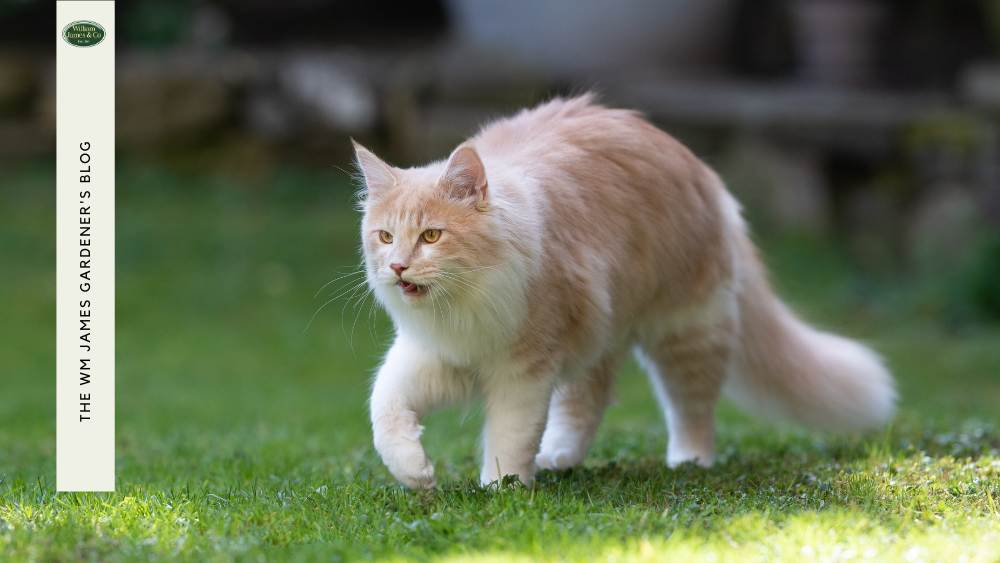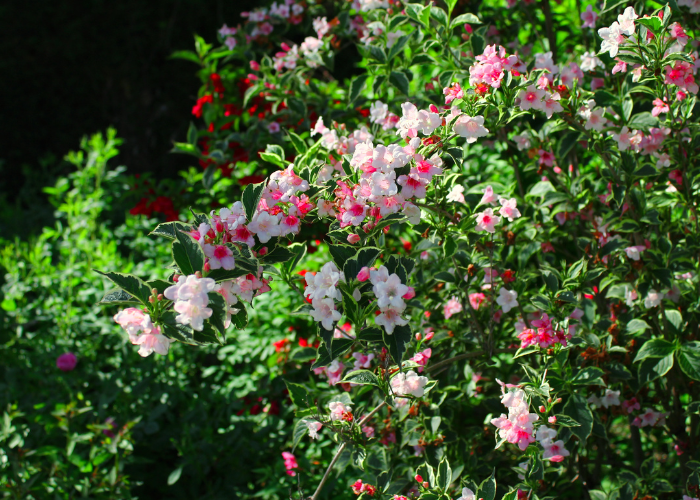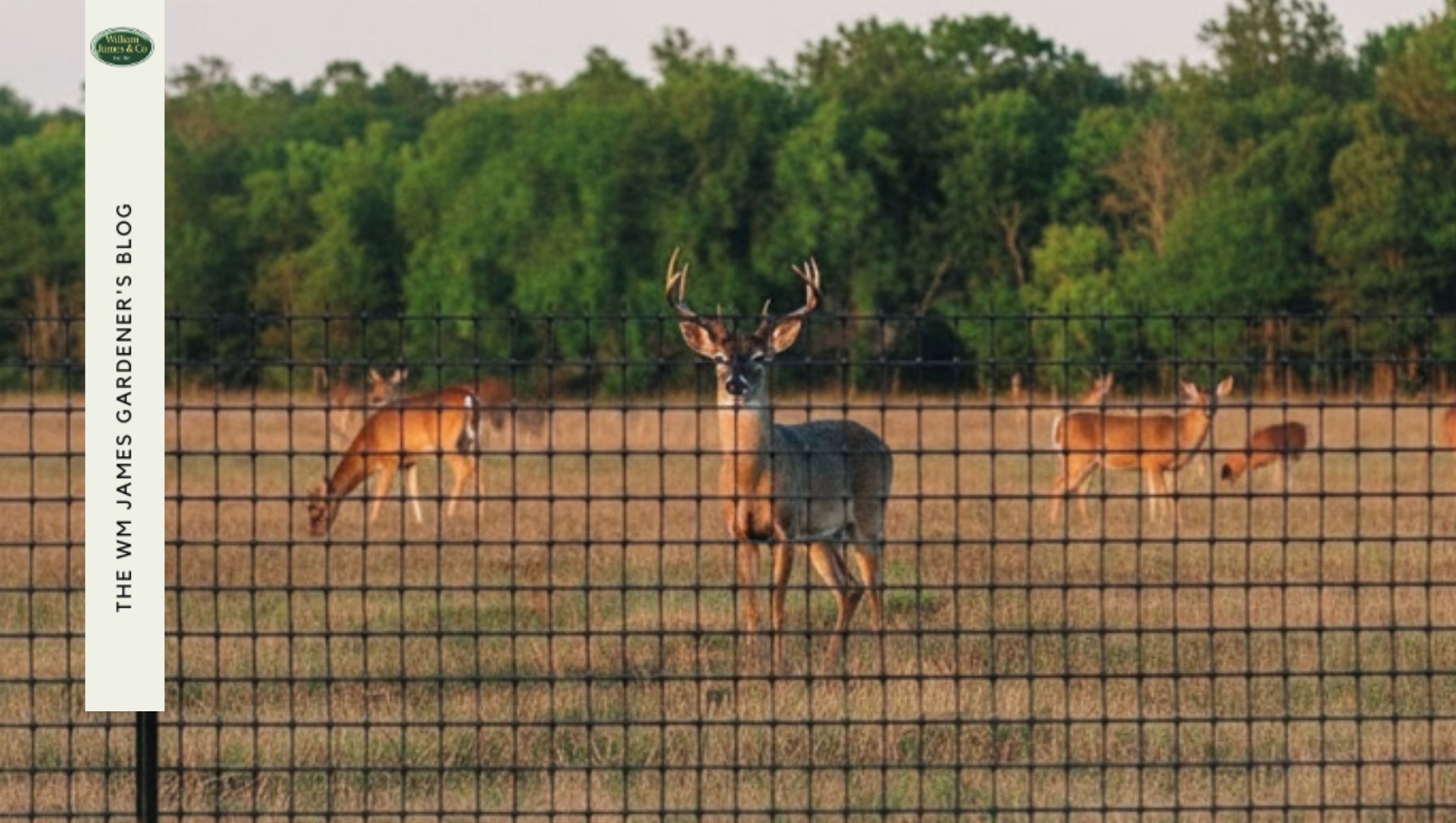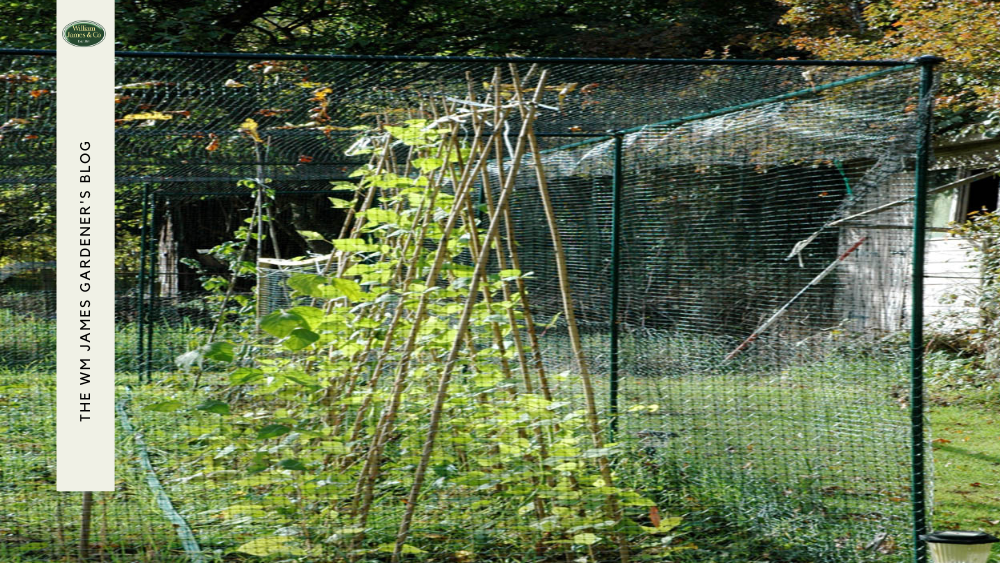We use cookies to make your experience better. To comply with the new e-Privacy directive, we need to ask for your consent to set the cookies. Learn more.
10 Tips on How to Keep Cats Out Of Your Garden (Harmlessly)
- Admin
- WM James Gardening Blog
- 2 Aug 2023
-
1783views

Unwelcome cats can be a nuisance in any garden. If you're having problems with the moggies, read our top 10 ways to keep cats at bay.
One of a gardener's greatest challenges is keeping cats out of the garden. They can dig up plants, scatter soil and lawn, use your flowerbeds as a litter box and cause your garden to look untidy. But how can you actually keep cats out of your garden?
Keeping cats out of your garden isn’t as easy as it sounds: while there are plenty of methods, many are unsafe for both cats and local wildlife. Also, some simply don’t work, and it can be frustrating when you still see cats in your garden despite all your efforts.
Plus, many methods just don't work, and it can be frustrating to still see cats in your garden despite all your efforts.
That's why we've put together this handy guide full of methods that do work. From our range of high-quality netting to nifty bin storage, WM James has you covered. Shop our recommended products below and get free delivery*!
Read more on keeping cats out of your garden and what you need to do it successfully.
#1 Install High Garden Fences
While cats are great climbers, high garden fences can deter some lazier cats, especially if they’re not near to trees or anything that cats can jump across from.
If you’re trying to use your fence to keep cats out of your garden, then make sure it’s at least 6 feet high and taller if possible. Ensure that your fence isn’t near any trees, and try adding a wire section at the top for more height and make it harder for intrepid kitties to find purchase.
#2 Set Up Cat Deterrent Netting
Another solution is to use netting to try and keep cats out of your garden, or at least away from specific areas of your garden.
For example, if you have a vegetable patch that you don’t want local cats to gain access to, then you could enclose this in netting.
The Best WM James Garden Netting for the Job
When you’re choosing netting to keep out cats, you need to make sure it’s robust and strong enough to keep even strong felines away.
Consider plastic chicken wire or fruit cage netting to prevent cats climbing (and other common garden pests) away from your plants.
If the cats in your area are particularly large, then consider using rabbit or deer netting that’s designed to keep out bigger animals and is strong enough to stop them from digging underneath it.
#3 Don't Feed the Cats (As Tempted As You May Be)
Local cats that visit your garden regularly might look hungry, but whatever you do, you mustn’t feed them. Often, these cats go from house to house begging for extra food when they actually have a loving human at home.
Some of these cats might be strays who are generally hungry, and if you suspect this is the case, then you should contact your local RSPCA and ask them to investigate.
While feeding them might seem kind, it can encourage the cats to come back to your garden and make them feel like they’re entitled to spend time there.
#4 Plant Your Garden Shrubs Close Together
Cats enjoy digging in gardens, so if you plant dense, woody shrubs close together, you’ll make your garden less interesting to cats.
Also, the textures of woody shrubs can be a deterrent for cats, as they don’t enjoy touching or digging against them, so you should consider choosing plants like Rhododendrons, Azaleas or Heather.
By choosing the right shrubs and planting them close together, you can make your garden seem less welcoming to inquisitive cats.
#5 Install a Garden Sprinkler System
Cats are notoriously averse to water, and while some buck the trend, most don’t like going to areas where they know they’re going to get wet.
So, one great solution is to use a sprinkler system to deter cats from roaming into your garden. Not only will sprinklers help keeps cats away, but they can also water your plants and flower beds, saving you precious time, so they’re worth considering.
To get the best from them and reduce water waste, consider setting your sprinklers on a timer at the times of day when cats visit your garden the most.
Alternatively, you could use motion sensors to set off the system whenever a cat walks by, which would scare them and could make them less likely to visit your garden again.
#6 Plant Pungent Herbs and Plants
Cats have very sensitive noses and are deterred by certain smells, so you might want to consider planting particularly pungent herbs and plants that cats aren’t a fan of.
Many of these plants smell great to humans, so you could create a fresh and fragrant garden that is appealing to you and your friends but not to any feline interlopers.
What Plants Deter Cats?
Some of the plants that cats don’t enjoy the smell of include:
- Lavender
- Citrus fruits
- Rue
- Rosemary
- Oregano
- Rose
- Coleus Caninus (which is despised by cats so much that it’s called the Scaredy Cat Plant)
- Pennyroyal
Most of these plants and herbs can grow well in most English gardens, so they’re easy to plant and will quickly flourish in most types of soil.
For scents such as citrus, which cats hate but which can be hard to grow in the UK, consider putting down orange or lemon peels or using natural oils in your garden.
Shop a selection of our high-quality sowing and growing tools below, and get started on planting your pungent plants and herbs!
#7 Lay Down Bark Mulch
Bristly textures deter cats, which is why they don’t like the feel of many woody shrubs. If you want to have a large open space but want to keep cats away, then you could lay down bark mulch.
Chippings and bark mulch can deter cats with their rough textures and stop them from digging or using the toilet on your garden borders.
Bark can also be useful for keeping weeds from growing in your garden and improving your soil quality, so it’s worth considering for a variety of reasons.
#8 Put Out an Ultrasonic Cat Repellent Device
As well as sensitive noses, cats also have great hearing and can interpret frequencies well above 20 kHz, the limit for human ears.
So, if you want to keep cats out of your garden and live in an area with many feline visitors, you might want to consider using an ultrasonic cat-repellent device.
These devices are small and discreet, so you won’t really notice them, but they can be used to emit a sound that cats can hear but humans cannot.
You won’t need to put them on all the time; just turn on your ultrasonic device at times when cats often visit your home, such as in the middle of the day and when it’s sunny outside.
#9 Don't Scatter Bird Food on the Ground
Cats are natural predators, and they are particularly fond of small garden songbirds. So, if you want to keep cats away from your garden and avoid birds getting killed in your space, then you need to keep any bird food you distribute away from the ground.
Instead of leaving bird seeds on the floor, consider putting them up high in a dedicated feeder that’s designed for delicate beaks and not the paws of other wildlife, like garden rats and squirrels.
You’ll then be able to welcome birds and deter any opportunistic cats who are looking for some ground-feeding birds to snack on.
#10 Keep Your Bins Locked Away
While they like eating birds, most cats aren’t that fussy about what they eat and will snack on anything they can see that looks tasty.
That includes rubbish, particularly food waste or uncleaned food containers, so you need to make sure that your bins are secure and that cats can’t get in.
The best way to do this is by using bin stores to tidy away your rubbish and make sure cats, and other garden pests, can’t access it.
WM James Bin Stores
Plastic wheelie bins with liftable lids can be easy for agile felines to break into, and once they have, they’ll enjoy eating anything they can find inside and will return to your garden to do it again.
So, consider a wooden bin store to keep your bins secure and stop cats or other larger pests from getting to your rubbish.
WM James offers a single wooden bin store for small households, and a double wooden bin store for homes with several bins, so there’s an option for everyone, and you can find a stylish yet functional solution to keep cats away from your rubbish.
The Law Surrounding Detering Cats from Your Garden
While your garden is your private property, that doesn’t mean you have free reign to deal with trespassers, especially feline ones.
Under the Animal Welfare Act 2006, you cannot deliberately harm or poison a cat, even if it isn’t your own and wanders into your garden.
The penalty for hurting or killing a cat is a fine or possibly imprisonment, so you need to make sure that you’re careful and that none of your cat deterrents is lethal or has the potential to harm the cat.
The tips listed in this article are designed to deter cats but not harm them, so they’re safe to use legally. If you’re using different techniques, make sure you check that they’re safe and won’t harm a cat by accident, as even unintentionally hurting or killing with a deterrent is illegal.
Rounding Up: How to Deter Cats From Your Garden Safely
Ultimately, there is no guaranteed way to keep cats from entering your garden, but there are ways to reduce the chances of them coming in and wreaking havoc. The techniques listed here are safe and easy to implement, meaning you could try out a few and see what works.
If you’re eager to keep other garden wildlife from entering and damaging your precious plants, then you can also set up fruit cages and structures to keep your garden safe and reduce the chance of insects and rodents eating your precious crops.
For more tips on keeping your garden safe and secure, check out our blog. We’re always adding new guides to help gardeners like you make the most of your outdoor space.
Shop the products we’ve recommended below, or head to our heavy-duty netting or structures collections for more!
*Get free UK delivery on orders over £100.
FAQs
Why Do Cats Go to the Toilet in Other People's Gardens?
Cats like to roam, so it’s natural that they might stop by other gardens. When they do, they often like to do their business there, as they don’t like the smell of it and want to keep it away from their own territory. Also, doing their business in other gardens can be a way of putting down their mark and keeping away other cats.
How Can I Stop Cats Pooping in My Garden?
The best way to stop neighbourhood cats from doing their business in your garden is to keep them away by using deterrents like ultrasonic devices and not feeding/welcoming them. Also, you should avoid putting down gravel in your garden, as this can look like cat litter and make excrement stand out.
What Will Keep Cats Away from My Garden?
If you’re wondering how to keep cats out of garden, there’s no one set method. Still, there are different approaches you can try, such as using an ultrasonic device, planting foliage that cats don’t like the smell of and making sure there’s no food available for cats to snack on, such as food waste. These strategies can help reduce the chances of cats coming into your garden.
What Smells Do Cats Dislike?
Many natural scents can deter cats, including citrus, lavender, tobacco, coffee, spicy pepper, citronella, lavender and eucalyptus. So, you could try adding oils or plants with these scents to ward off cats that visit your garden.
















